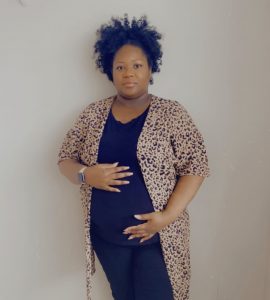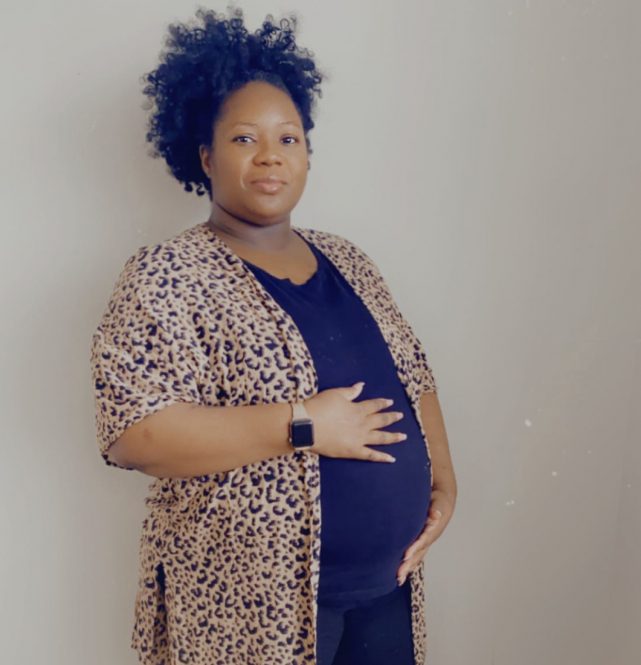Daisha Dillon, 31, of Manchester is overjoyed to be six months pregnant and expecting her first baby to be born this September.
But soon after her own birth she started her daily battle with sickle cell disease and the countless severe pain episodes that come with the inherited condition causing her red blood cells to be abnormally sickle-shaped.
“The pain I experience from sickle cell is shocking and feels like someone is stabbing you, abruptly and repeatedly,” says Dillon. “One of the stigma’s for sickle cell patients like me is I was told my whole life I can’t have kids. It will just be too painful.”
But together UConn Health and Dillon are striking out this misconception.

“UConn has really helped me to turn the tides and overcome barriers to motherhood,” happily shares Dillon. “Sickle cell does not define me or me as a person. There’s more to me than sickle cell!”
Dillon, who is expecting a baby girl, was diagnosed with the painful condition when she was just 6 months old when her first pain crisis struck her leading her Mom to take her to a local emergency room.
“I have had sickle cell disease my whole life,” says Dillon who at age 18 transitioned slowly from Connecticut Children’s pediatric sickle cell care program to the adult comprehensive care program at the New England Sickle Cell Institute at UConn John Dempsey Hospital led by Dr. Biree Andemariam. “UConn came up with my adult treatment plan and has always made me feel extremely confident in their care. My patient experience has been wonderful! They treat me with respect, allow me to make my care decisions, and also manage not only my sickle cell care needs but other conditions I face too.”
Navigating pregnancy with sickle cell disease is one of these challenges.
“This my first baby and I never would want anything to hurt my baby such as the pain medication I need to take for my sickle cell pain.”
Dillon says UConn Health has been with her every step of the way in her journey to motherhood.
“I am having a baby girl. I am so confident in my care team at UConn Health from sickle cell disease to pregnancy,” says Dillon who is also being cared for by OB/GYN Dr. Richard Wagner of the UConn Health Women’s Center.

Plus, Dillon is especially grateful to the Institute’s Dr. Genice Nelson: “Dr. Nelson is one of the people in my corner the entire time giving me not only medical advice but life advice as well.”
Dillon’s advice to other young women living with sickle cell disease dreaming of motherhood is to trust yourself and your medical team to make your motherhood dreams come true.
“Never give up,” says Dillon. “Only you can write your future and set your goals. Sickle cell is just a disease, nothing else.”
Dillon adds: “I am not the first person with sickle cell disease to have a child, and I won’t be the last!”
She is also hoping a cure comes along someday for sickle cell disease.
“I hope we can raise more awareness of sickle cell disease, and with greater awareness comes more advances in care. I do pray there will be a cure someday so we all can have long lives, careers, and the stigmas of sickle cell disease stops.”
And Dillon loves everyone who cares for her at UConn Health.
“I trust UConn Health with me and also my baby. They take care of me like family,” stresses Dillon. “If I am in pain or don’t feel well I can always call and they call me right back. They really care.”
UConn Health has also significantly improved Dillon’s disease and quality of life.
To manage her pain crises prior to pregnancy, Dillon started taking the new once-a-month IV sickle cell drug Adakeo at UConn Health’s outpatient New England Sickle Cell Institute. The medication has helped her drastically reduce her monthly pain episodes and hospitalization needs. The medication works by targeting a protein to prevent her misshaped red blood cells from becoming sticky and blocking her blood vessel blockages which lead to her sickle cell pain.
Dillon also shared a big hope for her soon-to-be born daughter.
“My biggest hope for my baby girl is that she grows up to be big and strong – and is a healthy, healthy baby!”



